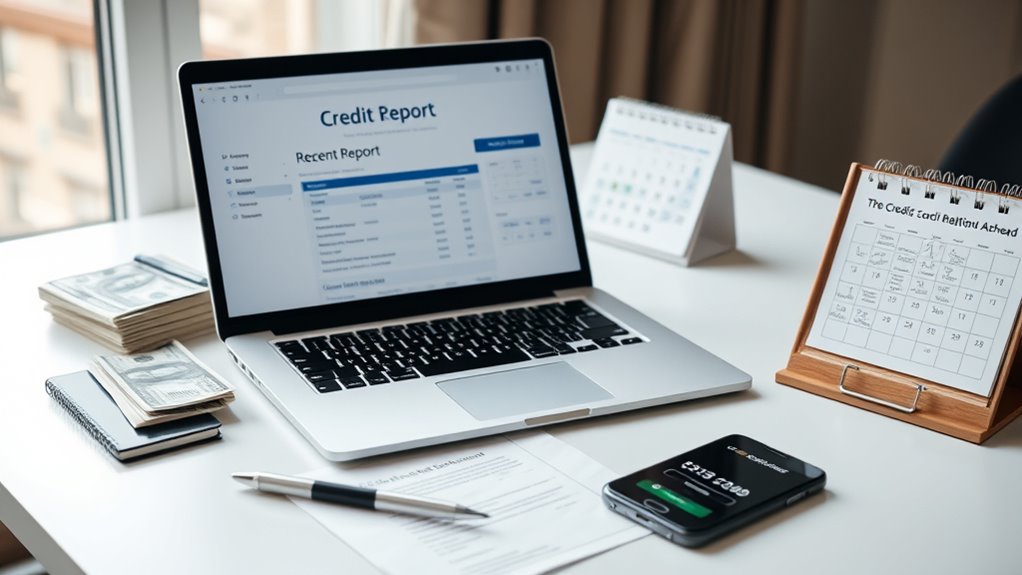Six months before leasing your business space, review your credit reports for errors or outdated info and dispute any inaccuracies. Focus on paying down debts, especially credit cards, and making all payments on time to boost your score. Avoid new debt and monitor your credit progress regularly. By improving your credit early, you’ll demonstrate financial responsibility and increase your chances of securing the best lease terms. Keep exploring to learn more steps you can take.
Key Takeaways
- Review and dispute any errors on your credit reports from Equifax, Experian, and TransUnion.
- Pay down existing debts and make all payments on time to improve your credit score.
- Avoid new credit applications or debt during the six months to maintain a stable credit profile.
- Create a budget to ensure timely lease payments and build an emergency fund for financial stability.
- Monitor your credit progress regularly and adjust strategies to strengthen your creditworthiness.

If you’re planning to lease a business space, it is essential to start preparing your credit at least six months in advance. This period gives you enough time to address any issues and improve your credit profile, making your application more attractive to landlords or leasing agents. Successful leasing often depends on your credit standing, so investing time in credit repair and solid financial planning now can considerably boost your chances of approval.
Begin by reviewing your credit reports from all three major bureaus—Equifax, Experian, and TransUnion. Look for errors, outdated information, or negative marks that could harm your credit score. Disputing inaccuracies early on allows you to correct mistakes that might otherwise prevent you from securing the lease. During this process, you also want to understand your credit score and what factors influence it. This insight helps you identify areas needing improvement, such as reducing debt, increasing your payment history, or lowering your credit utilization rate.
Credit repair should be your immediate focus. Pay down existing debts, especially credit card balances, since high utilization ratios can lower your score and signal financial instability. Make all payments on time moving forward, as consistent, punctual payments are a key factor in boosting your credit profile. If you have missed payments or accounts in collections, work on negotiating settlement or establishing payment plans to demonstrate your commitment to financial responsibility. The goal is to present a clean, responsible credit history that reassures landlords of your reliability.
Alongside credit repair, you need to implement careful financial planning. Create a budget that accounts for your expected lease payments, operational costs, and other expenses. Keep your debt-to-income ratio manageable, since a high ratio could raise concerns about your ability to meet lease obligations. Establish an emergency fund to cover unexpected costs, which shows stability and preparedness to landlords. Your financial plan should also include a timeline for improving your credit, ensuring that you’re actively working toward the goal of stronger creditworthiness by the time you need to sign the lease.
Throughout this six-month period, stay disciplined and avoid taking on new debt that could negatively impact your credit profile. Regularly monitor your credit progress and adjust your strategies as needed. Building a good credit history isn’t just about fixing past mistakes; it’s about demonstrating responsible financial behavior that will give landlords confidence in your ability to honor lease commitments. Developing a credit profile that showcases your financial responsibility can significantly influence leasing decisions. By dedicating time to credit repair and sound financial planning early on, you position yourself for a smoother leasing process and better terms.
Frequently Asked Questions
How Can I Improve My Credit Score Quickly Before Leasing?
To boost your credit score quickly, start by checking your credit monitoring reports for errors and disputing any inaccuracies. Pay down existing debts, especially high-interest ones, and consider debt consolidation to simplify payments and reduce your debt-to-credit ratio. Make all your payments on time, avoid opening new accounts, and keep your credit utilization low. These steps can help improve your score before leasing, making you a more attractive candidate.
What Common Mistakes Should I Avoid When Preparing Credit?
Ever wonder what pitfalls could hurt your credit report? You should avoid common mistakes like missing payments, which damage your credit score and hinder debt management. Don’t apply for multiple new credit lines at once, as it looks risky. Also, neglecting to check your credit report for errors can cost you. Staying on top of these issues helps you build a strong credit profile, making leasing easier and more secure.
Are There Specific Credit Scores Required for Certain Leasing Options?
You might think certain leasing options require specific credit scores, but credit myths often lead to misconceptions. Leasing terminology can be confusing, making it seem like only perfect credit qualifies you. In reality, lenders consider various factors, and your score isn’t the only criterion. Focus on improving your overall credit health, and don’t get discouraged by myths—your credit score can often meet requirements with responsible financial habits.
How Does Recent Credit Activity Affect Leasing Approval Chances?
Your recent credit activity directly impacts your leasing approval chances. Lenders review your credit report to see your latest financial history, including timely payments and recent debts. If your recent activity shows responsible borrowing, it boosts your chances of approval. Conversely, recent missed payments or new debt can raise concerns. Staying current and managing your credit report responsibly demonstrates financial stability, making you a more attractive lease candidate.
Should I Pay off Existing Debts Before Applying for Leasing?
Paying off existing debts before applying for leasing can boost your approval chances. Debt consolidation helps you manage multiple debts, potentially lowering your credit utilization ratio, which lenders see positively. By reducing your debt, you show responsible financial behavior, making you a more attractive lease candidate. So, take the time to pay down debts, consolidate if needed, and improve your credit profile before you apply.
Conclusion
By starting your credit preparations six months early, you give yourself time to improve your score and address any issues. For example, imagine applying for a lease and having a solid credit history, which increases your chances of approval and better terms. Taking proactive steps now, like paying down debt or correcting errors, can make all the difference. Remember, good credit isn’t built overnight—so start early and set yourself up for leasing success.










